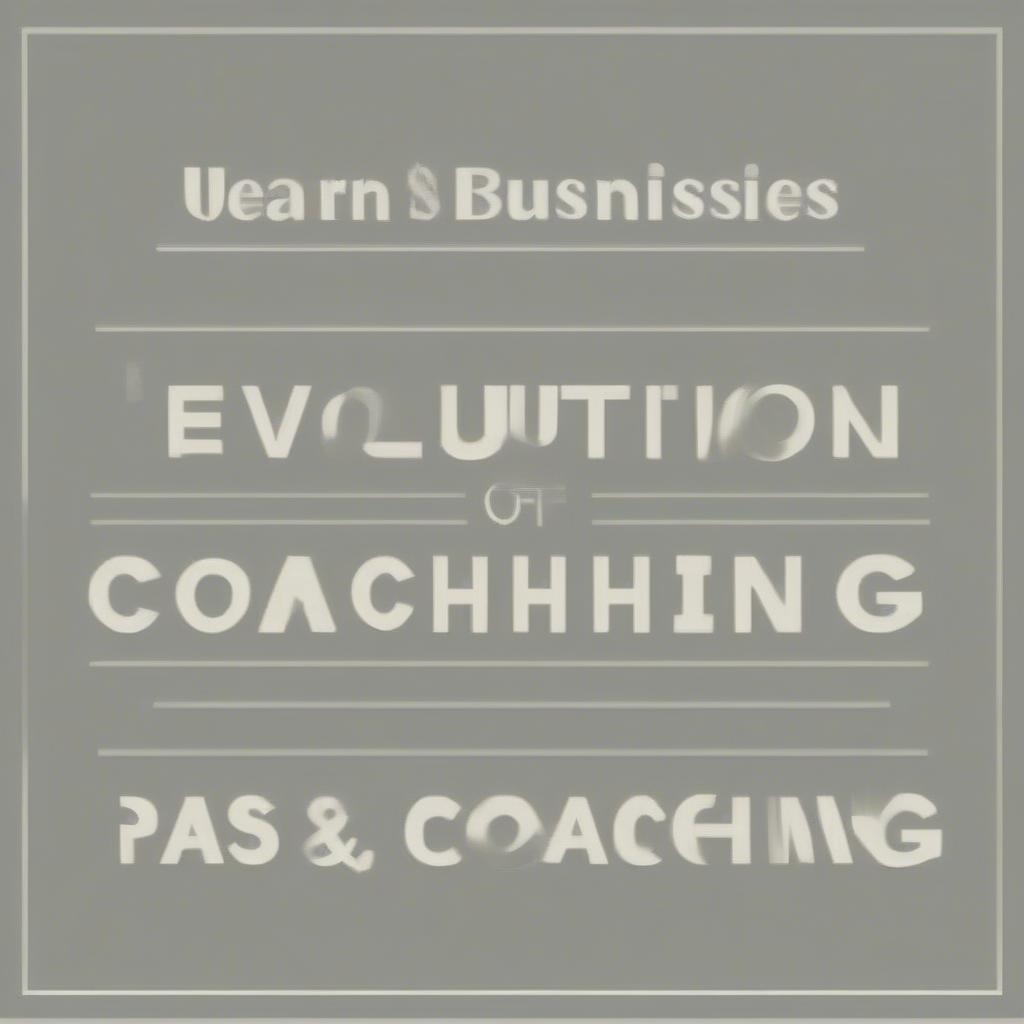
Coaching, when done right, isn’t just a fleeting trend. It’s a powerful catalyst for growth, transformation, and enduring success. But in a world saturated with coaches, how do you build coaching services that not only resonate today but also possess the timeless strategies needed for business longevity? This article delves into the essential elements that separate enduring coaching businesses from those that fade into obscurity.
I. Understanding the Core of Timeless Coaching
Before diving into strategies, let’s define what truly makes a coaching service timeless. It’s about more than just being trendy; it’s about building a foundation based on fundamental human needs and proven principles.
A. Identifying Universal Human Needs
At the heart of any successful coaching service lies an understanding of core human needs. These needs, largely unchanged throughout history, drive behavior and motivation. Address these, and you’ll tap into a wellspring of client demand:
- Purpose and Meaning: People crave a sense of purpose and significance in their lives and work. Your coaching services should help clients clarify their values, define their vision, and align their actions with their deepest aspirations.
- Example: A life coach helps a client rediscover their passion for writing after years of working in a soul-crushing corporate job.
- Growth and Development: Humans are inherently wired to learn, grow, and improve. Offer timeless strategies that facilitate continuous learning, skill development, and personal evolution.
- Example: A leadership coach helps a CEO develop more effective communication and delegation skills, resulting in improved team performance and employee morale.
- Connection and Belonging: The need for meaningful relationships and a sense of community is fundamental. Foster connection within your coaching programs and help clients build stronger relationships in their personal and professional lives.
- Example: A relationship coach guides a couple through conflict resolution techniques, strengthening their bond and improving communication.
- Autonomy and Control: Individuals desire a sense of control over their lives and destinies. Empower clients to make informed decisions, take ownership of their actions, and create the life they desire.
- Example: A career coach helps a client navigate a career transition, empowering them to take charge of their professional path and find fulfilling work.
- Contribution and Impact: People want to make a difference in the world. Help clients identify their unique gifts and talents and use them to create a positive impact.
- Example: A business coach assists a social entrepreneur in developing a sustainable business model that addresses a critical social need.
B. Grounding Coaching in Evidence-Based Practices
While intuition and personal experience are valuable, grounding your coaching services in evidence-based practices ensures effectiveness and credibility. This means:
- Researching Proven Methodologies: Familiarize yourself with established coaching models, psychological theories, and business principles that have demonstrated positive results.
- Examples: Cognitive Behavioral Coaching (CBC), Solution-Focused Coaching, Motivational Interviewing, Appreciative Inquiry.
- Tracking Client Outcomes: Implement systems for tracking client progress and measuring the impact of your coaching. Collect data to identify what works best and continuously improve your approach.
- Templates: Use feedback forms, pre- and post-coaching assessments, and progress reports to gather valuable data.
- Staying Updated on the Latest Research: The field of coaching is constantly evolving. Stay current on the latest research and best practices by attending conferences, reading industry publications, and engaging in continuing education.
- Integrating Best Practices: Incorporate time-tested principles of human behavior, leadership, and personal development into your coaching framework. These principles remain relevant regardless of current trends.
C. Building a Strong Foundation for Business Longevity
Business longevity requires more than just excellent coaching skills; it demands a solid business foundation.
- Developing a Clear Value Proposition: Clearly articulate the unique benefits of your coaching services and how they address the specific needs of your target audience.
- Creating a Sustainable Business Model: Design a business model that is financially viable and scalable. Consider various pricing strategies, service offerings, and delivery methods.
- Building a Strong Brand: Develop a brand that reflects your values, expertise, and the unique experience you offer clients.
- Establishing a Robust Marketing Strategy: Implement a marketing strategy that effectively reaches your target audience and generates leads.
- Focusing on Client Retention: Prioritize client satisfaction and build long-term relationships to foster repeat business and referrals.
II. Crafting Timeless Coaching Programs and Services
Now, let’s explore the specific strategies you can use to create coaching services that stand the test of time.
A. Designing Programs with Lasting Impact
The design of your coaching programs significantly impacts their long-term effectiveness.
- Focus on Transformational Change: Aim to facilitate deep, lasting change in your clients’ lives, rather than just providing quick fixes or temporary solutions.
- Example: Instead of simply teaching time management techniques, help clients identify and address the underlying beliefs and habits that contribute to procrastination.
- Create Personalized Learning Experiences: Tailor your coaching approach to the individual needs, goals, and learning styles of each client.
- Strategy: Use assessments, intake questionnaires, and ongoing feedback to personalize the coaching experience.
- Incorporate Actionable Steps and Accountability: Provide clients with clear, actionable steps they can take to achieve their goals. Hold them accountable for their progress and provide ongoing support and encouragement.
- Template: Use a weekly action plan template to help clients prioritize tasks and track their progress.
- Foster a Growth Mindset: Encourage clients to embrace challenges, learn from setbacks, and believe in their ability to grow and improve.
- Technique: Use positive affirmations, reframing exercises, and success stories to cultivate a growth mindset.
- Develop Sustainable Habits: Help clients develop habits that support their long-term success and well-being.
- Strategy: Use habit tracking tools, accountability partners, and reward systems to reinforce positive habits.
B. Leveraging Technology for Enduring Value
Technology can significantly enhance the reach and impact of your coaching services, but it’s crucial to use it strategically.
- Online Coaching Platforms: Utilize online platforms to deliver coaching sessions, share resources, and facilitate communication.
- Examples: Zoom, Skype, Google Meet, coaching management platforms.
- Digital Resources and Tools: Provide clients with access to digital resources such as ebooks, articles, templates, and assessments.
- Automation and Efficiency: Automate administrative tasks such as scheduling, invoicing, and follow-up emails to free up your time and focus on coaching.
- Data Analysis and Insights: Use data analytics tools to track client progress, identify trends, and improve the effectiveness of your coaching programs.
- Caution: Avoid relying solely on technology. Remember that the human connection and personalized attention are essential elements of effective coaching.
C. Building a Strong Community Around Your Coaching
Creating a sense of community around your coaching services can enhance client engagement, foster loyalty, and generate referrals.
- Online Forums and Groups: Create online forums or groups where clients can connect with each other, share experiences, and support one another.
- Examples: Facebook groups, LinkedIn groups, private online communities.
- Group Coaching Sessions: Offer group coaching sessions to provide clients with opportunities to learn from each other and build relationships.
- Networking Events: Organize networking events to connect clients with each other and with other professionals in their field.
- Guest Speakers and Experts: Invite guest speakers and experts to share their knowledge and insights with your community.
- Create a Sense of Belonging: Foster a welcoming and supportive environment where clients feel valued, respected, and understood.
III. Adapting to Change While Staying True to Your Core
The business landscape is constantly evolving, so it’s essential to adapt to change while staying true to your core values and expertise.
A. Embracing Lifelong Learning
To provide timeless strategies, you must commit to lifelong learning and continuous improvement.
- Stay Updated on Industry Trends: Keep abreast of the latest developments in your field by reading industry publications, attending conferences, and engaging in continuing education.
- Seek Feedback from Clients and Peers: Regularly solicit feedback from clients and peers to identify areas for improvement and gain new perspectives.
- Experiment with New Approaches: Be willing to experiment with new coaching techniques, tools, and technologies to enhance the effectiveness of your coaching services.
- Invest in Your Own Development: Invest in your own personal and professional development to stay sharp, energized, and inspired.
B. Responding to Shifting Client Needs
Client needs are constantly evolving, so it’s crucial to stay attuned to their changing priorities and challenges.
- Conduct Regular Needs Assessments: Conduct regular needs assessments to identify the emerging needs and challenges of your target audience.
- Listen Actively to Your Clients: Pay close attention to what your clients are saying, both verbally and nonverbally, to understand their needs and concerns.
- Adapt Your Programs and Services: Be willing to adapt your coaching programs and services to meet the evolving needs of your clients.
- Offer Customized Solutions: Provide clients with customized solutions that address their specific needs and challenges.
C. Building Resilience in Your Business
Business longevity requires resilience – the ability to bounce back from setbacks and adapt to changing circumstances.
- Develop a Strong Financial Foundation: Maintain a healthy cash flow, build a financial reserve, and diversify your income streams to weather economic downturns.
- Cultivate a Supportive Network: Build a strong network of mentors, advisors, and peers who can provide support and guidance during challenging times.
- Embrace Failure as a Learning Opportunity: View setbacks as opportunities to learn, grow, and improve.
- Practice Self-Care: Prioritize your own well-being to avoid burnout and maintain your energy and focus.
- Stay Flexible and Adaptable: Be willing to pivot your business strategy and adapt to changing market conditions.
IV. Marketing Your Timeless Coaching Services
Having outstanding coaching services is only half the battle; you need to effectively market them to attract the right clients.
A. Emphasizing Value Over Trends
Focus on showcasing the enduring value of your coaching services rather than chasing fleeting trends.
- Highlight the Long-Term Benefits: Emphasize the long-term benefits of your coaching, such as increased productivity, improved relationships, and greater fulfillment.
- Share Client Testimonials and Success Stories: Share client testimonials and success stories to demonstrate the tangible results of your coaching.
- Focus on Building Trust and Credibility: Establish yourself as a trusted authority in your field by sharing valuable content, speaking at conferences, and publishing articles.
- Offer Free Consultations or Workshops: Provide potential clients with a taste of your coaching style and expertise through free consultations or workshops.
B. Leveraging SEO for Long-Term Visibility
Implement a robust SEO strategy to ensure your coaching services are visible to potential clients searching online.
- Keyword Research: Identify relevant keywords that your target audience is using to search for coaching services. (Examples: coaching services, timeless strategies, business longevity, career coaching, leadership coaching, life coaching).
- On-Page Optimization: Optimize your website and content for relevant keywords, including your page titles, meta descriptions, headings, and body text.
- Content Marketing: Create valuable and engaging content that attracts and educates your target audience.
- Ideas: Blog posts, articles, ebooks, videos, podcasts.
- Link Building: Build high-quality backlinks from other reputable websites to improve your search engine ranking.
- Local SEO: Optimize your website and online listings for local search to attract clients in your geographic area.
C. Building a Strong Online Presence
Establish a strong online presence to reach a wider audience and build your brand.
- Website: Create a professional website that showcases your coaching services, expertise, and client testimonials.
- Social Media: Engage with your target audience on social media platforms such as LinkedIn, Facebook, and Twitter.
- Email Marketing: Build an email list and send regular newsletters to stay in touch with potential and current clients.
- Online Directories: List your coaching services in online directories such as Yelp, Google My Business, and industry-specific directories.
V. Learn Business: Your Partner for Business Longevity
At Learn Business, we understand the challenges businesses face in today’s dynamic environment. We are dedicated to providing the guidance and resources needed to achieve business longevity. We support businesses by offering guidance and templates tailored to their specific needs.
Here’s how Learn Business can specifically assist coaches in creating coaching services that stand the test of time:
- Business Plan Templates: Craft a solid business plan outlining your value proposition, target market, and financial projections, laying the groundwork for a sustainable coaching business.
- Marketing Strategy Templates: Develop a comprehensive marketing strategy to effectively reach your ideal clients and build brand awareness.
- Client Management Systems: Streamline your client onboarding, session scheduling, and communication with our client management templates, freeing you up to focus on coaching.
- Financial Management Tools: Track your income, expenses, and profitability with our financial management templates, ensuring the financial health of your coaching business.
- Legal Templates: Access essential legal templates to protect your business and ensure compliance with relevant regulations.
Learn Business provides the tools and resources you need to build a thriving coaching business that not only survives but thrives for years to come.
VI. Conclusion: Investing in the Future of Your Coaching
Creating coaching services that possess timeless strategies and contribute to business longevity is an ongoing journey. It requires a deep understanding of human needs, a commitment to evidence-based practices, a focus on client transformation, and a willingness to adapt to change. By investing in these essential elements, you can build a coaching business that not only thrives today but also makes a lasting impact on the lives of your clients and the world around you. Embrace the principles outlined in this article, leverage the resources available at Learn Business, and embark on a journey to create a coaching legacy that will endure for generations to come.



Leave a Reply